Untouched by Light by Bruketa&Žinić&Grey Agency Wins Best Packaging Design Launched in 2020
June 7, 2021 - After a few weeks of discussions and consultations, the judges agreed that Untouched by Light by Croatian Bruketa&Žinić&Grey Agency was the best packaging design launched in 2020.
It is a special honour in itself, but especially since it is the first time in their hundred-year history that Art Directors Club New York awards the Best of Disciplines to a Croatian Agency. ADC 100th Annual Awards is actually the longest-running international competition in advertising and design, and the Awards Ceremony will take place on Wednesday, June 9, 2021, in New York City.

UBL is a project designed by B&Ž&G Agency for a Slovenian winery Radgonske Gorice. Instead of an advertising campaign, B&Ž&G Agency created a completely new product – a sparkling wine produced in complete darkness. The entire project rests upon a research study by Prof. Nobel, University of California, who proved that light has an adverse effect on sparkling wines and their aromas. In keeping with this fact, and as suggested by the Agency, Radgonske Gorice adapted their production process, which is now carried out in pitch darkness, from harvest to distribution, using night vision goggles.
Untouched by Light - case film from Bruketa&Zinic&Grey on Vimeo.
The bottle packaging is also one-of-a-kind, designed to be light-proof. The ADC judges decided to award both the very idea and the design. The idea has already received great acclaim. It has been covered by the media worldwide: such as The Washington Post, The Independent, Forbes, Der Spiegel, Decanter, and Wine China, in more than 230 press releases, kindling the interest of distributors not only in this product but also in other products by Radgonske Gorice.
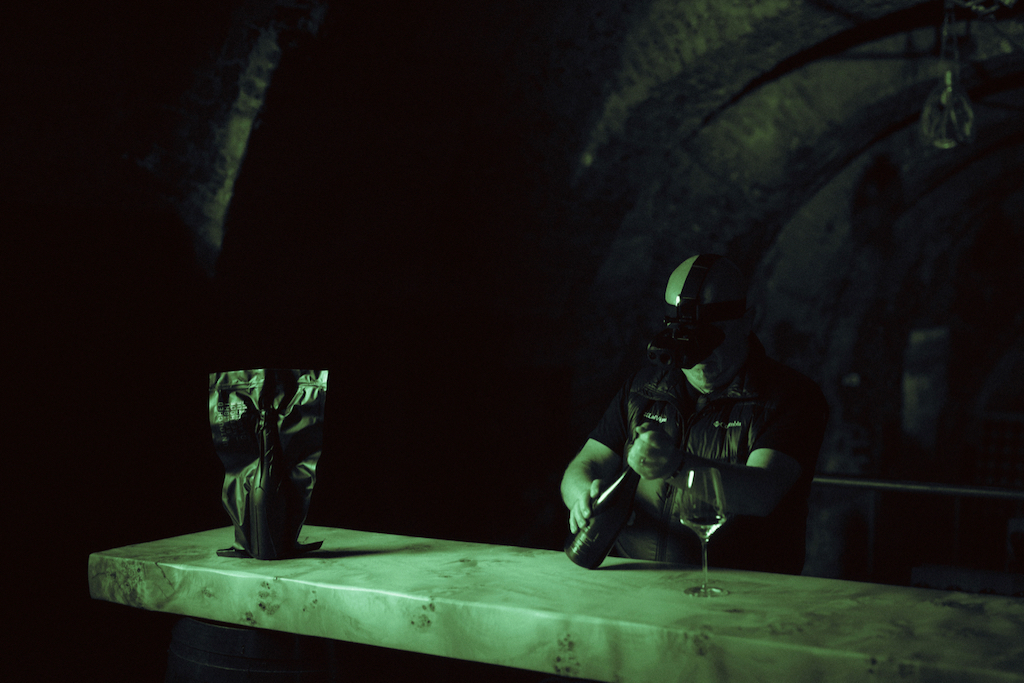
"This project shows that local businesses can successfully turn to the global market. The creative potential of agencies can be used for much more than just an ad creation. Original products and services find an easier way to reach their customer," said Davor Bruketa, Creative Director at Bruketa&Žinić&Grey Agency, which has become the most award-winning Croatian agency in this competition and the only one to have earned the Best of Disciplines title.
You can read more about Bruketa&Žinić&Grey Agency HERE.
For more on lifestyle in Croatia, follow TCN's dedicated page.
2021 Gault&Millau Croatia Guide Presented with Over 400 Restaurants, Bars, and Wines
Jun 7, 2021 - The fourth edition of the international 2021 Gault&Millau Croatia guide was presented in Zagreb last week, including more than 400 restaurants, popular bars, and wines from all over Croatia.
HRTurizam reports that despite several months of lockdown, Gault&Millau Croatia is the only gastronomic guide published ahead of the tourist season. This is a strong incentive to promote the restaurant scene in the domestic and foreign markets. In almost 60 years of existence, this guide has established itself in 25 countries, and chef's caps printed on a yellow sticker guarantee proven quality.
“We are aware that this period is full of challenges for caterers and chefs, who may have suffered the most from the lockdown. Gault&Millau wants to encourage them to continue to fight and to remain committed to the food and dishes of their region together with small food and wine producers," said Ingrid Badurina Danielsson, director of the Croatian Gault&Millau.
On that occasion, trophies were traditionally awarded to the best chefs and restaurants in Croatia.
Thus, according to the choice of Gault&Millau Croatia guide, Fabricio Vežnaver from the restaurant Pergola from Zambratija, near Savudrija, was chosen Chef of the Year. Three chefs won the great chef of tomorrow - Marina Gaši, from the Marina restaurant in Novigrad, Matija Bogdan from the Zagreb restaurant Mano, and Marko Gajski, chef of the LD restaurant from Korčula.
The trophy of the chef of traditional cuisine went to Marica Posavec from the restaurant Didin konak in Kopačevo, while Zlatko Marinović, the chef of the Split restaurant Noštromo, won the Trophy of the chef of the new traditional cuisine. The Young Talent of the Year trophy was won by Dino Knežević from the Nobilion restaurant at the Ikador hotel in Ika, and Bernard Korak from the Korak restaurant in Jaska.
Jacqueline Troskot, the owner of the Amélie patisserie, won the Chef Pastry Chef Trophy and the Šibenik tavern Marenda 2 and its boss Ankica Milković won the Trophy for the best POP bar.
The trophy of the head of the hall & service in 2021 was won by the duo - Davide Kmet and Davor Antolović from Rio Snack Bar in Rovinj. In the category of the best restaurants, 360 from Dubrovnik and its chef Marijo Curić, and Šibenik's Pelegrini and its owner and chef Rudolf Štefan celebrated. For the first time in four years that Gault&Millau is present in Croatia, the Merit Trophy was awarded to a group of chefs united in the Chef Cooks at Home initiative.
At the Gault&Millau ceremony, Raise the Bar scholarships were presented to young participants in this Coca-Cola educational program, intended to improve quality and knowledge in the hospitality and tourism segment.
For more on lifestyle in Croatia, follow TCN's dedicated page.
Ahead of Zagreb Digital Nomad Week, Jan de Jong Interview on Croatia's Progress
June 7, 2021 - It has been a breathtaking year on the digital nomad scence in Croatia. As the Croatian capital gears up for Zagreb Digital Nomad Week 2021 & Zagreb Digital Nomad Ambassador Project, TCN catches up with the man who set the ball rolling with that open letter to the Prime Minister - Split-based Dutch entrepreneur, Jan de Jong.
1. It is almost 11 months since you wrote the famous open letter on LinkedIn to Prime Minister Andrej Plenkovic. What were your hopes and expectations back then, and how do you feel about the consequences of that letter?
When I wrote the open letter to our PM Plenkovic, I had zero expectations and really high hopes. Prior to my open letter, I had already tested the opinion of the general public about welcoming digital nomads to Croatia - through various LinkedIn posts. And the response was each time overwhelming. So, I expected a lot of support for my open letter, but that we would actually change the laws in Croatia, within such a short time period – was something I could only dream of.
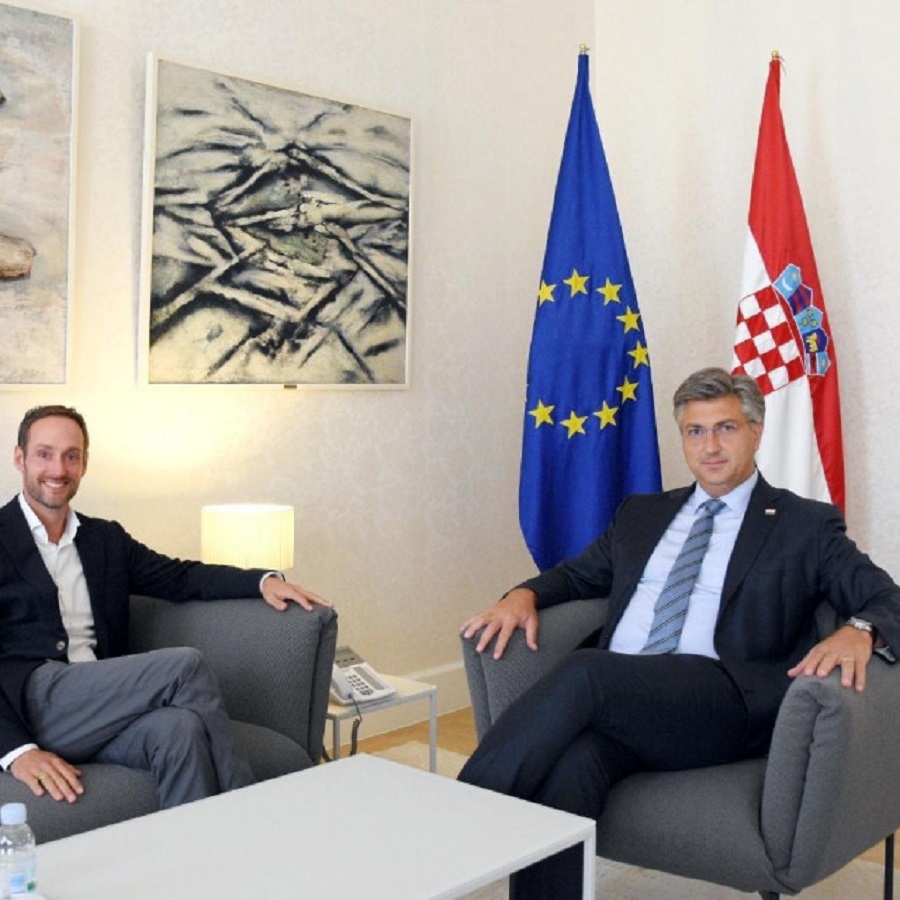
2. It has been an action-packed 11 months. Can you give us three high points from the journey?
The 3 high points were definitely the invitation to meet with the Ministry of Interior, as this was the first confirmation that my request for introducing a digital nomad visa was heard. The second high point was my meeting with the Prime Minister, when he shared his support for this initiative. The third high point was January 1st, 2021 – when the laws became active and when the first digital nomad got approved her staying permit soon after.
3. Along with Tanja Polegubic of Saltwater Nomads and Karmela Tancabel, you are a co-founder of Digital Nomad Association Croatia, with a website going live next week. Tell us a little about DNA Croatia - why did you found it, what is its purpose, and who is it aimed at?
The moment we knew that Croatia was going to be among the first countries in the world to welcome digital nomads, we decided that we wanted to have a more coordinated approach to supporting and uniting digital nomads in Croatia. This is not a job for one man/woman, so we wanted to start an association where other people can get involved in pursuing our mission. There are several stake-holders in all this: 1) The digital nomads. 2) Companies and individuals who wish to serve digital nomads and last but not least – we want to be the bridge between the digital nomad eco-system and the Croatian government.
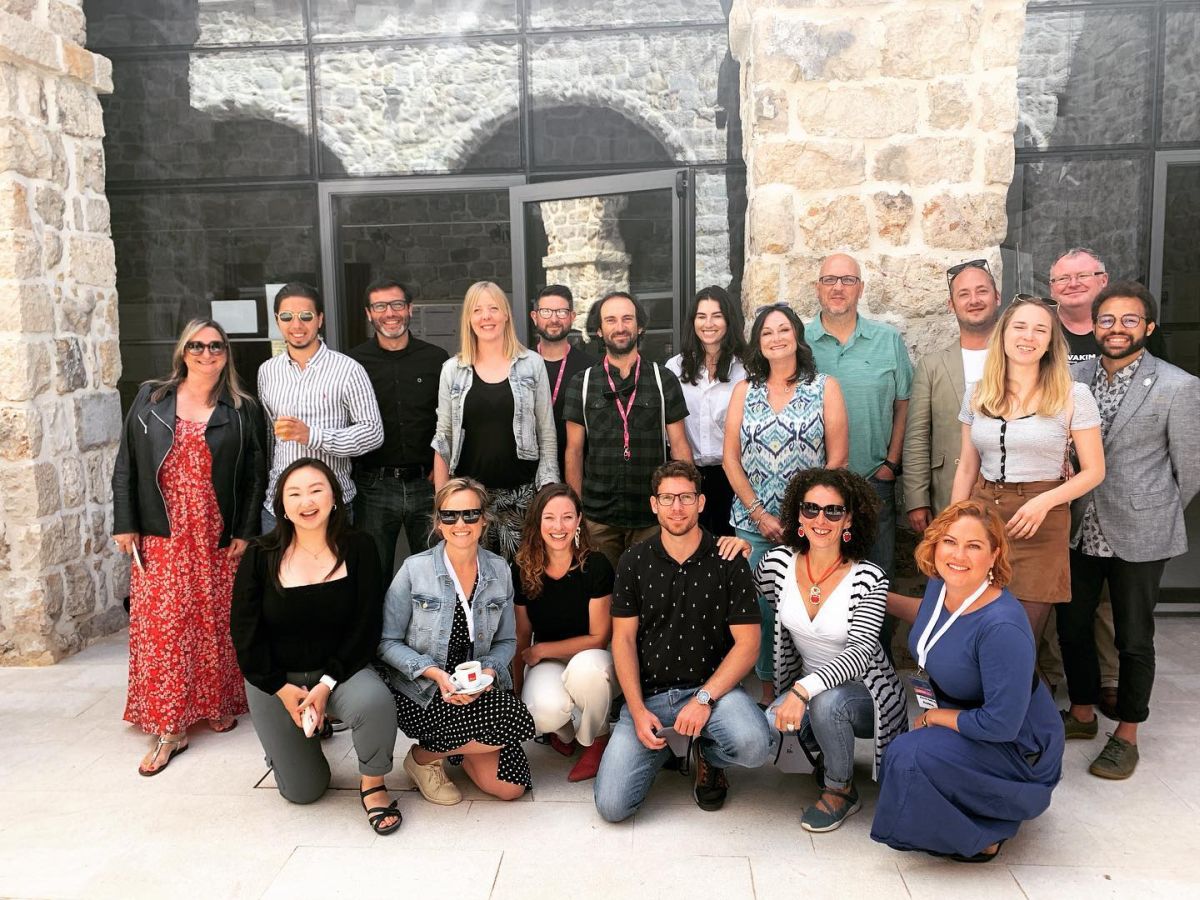
4. You are just back from Dubrovnik, where DNA took part in the final day of Dubrovnik Digital Nomads-in-Residence, which was organised by the City of Dubrovnik, Dubrovnik Tourist Board, Saltwater Nomads and TCN. Tell us a little about the energy down there, and what Dubrovnik learned from its 10 nomadic residents.
Aside from a stunning location, amazing weather and great people, to me it feels that this event is a gathering of lots of positivity and optimism – something we can definitely use in Croatia. At an event like this, we don’t talk about the challenges we are facing in Croatia or about what could have been done better. We talk about opportunities and what needs to be done in order to fully utilize our potential of becoming Europe’s hot spot for digital nomads.
The DNiR program was a co-creation event between digital nomads and local government/tourist board. Together, they came up with a 4-A strategy: Attract, Accommodate, Amaze & Amplify.
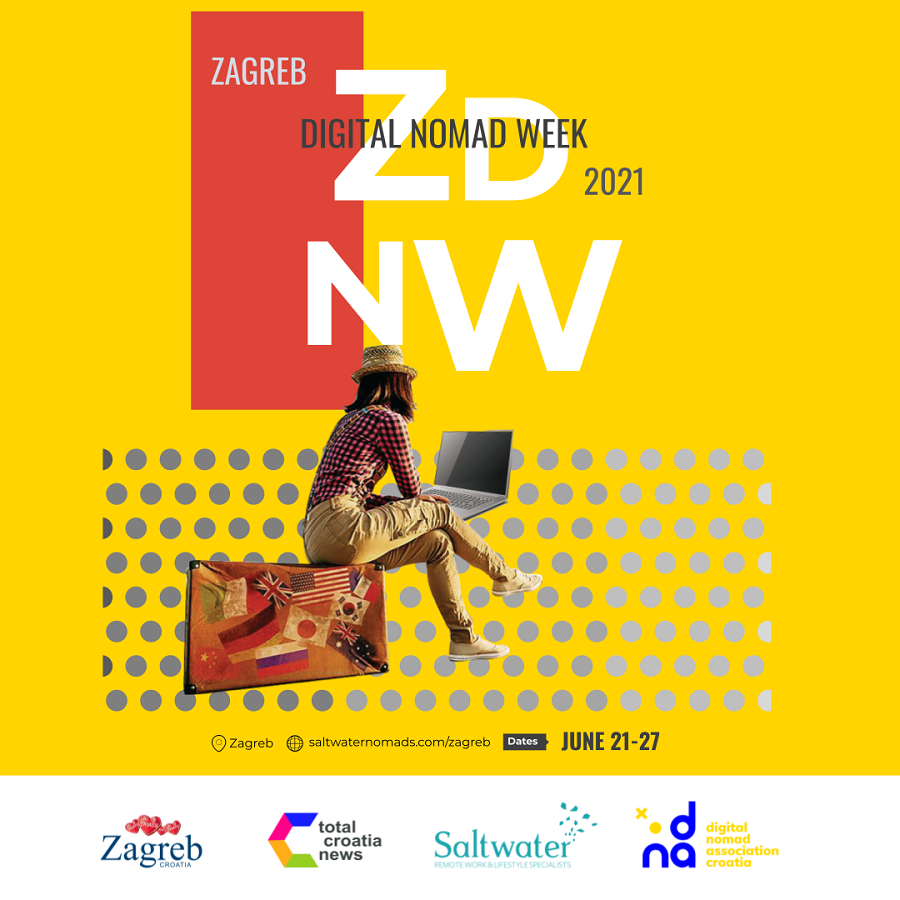
5. The focus now shifts to Zagreb, with DNA, TCN, Saltwater Nomads and the Zagreb Tourist Board hosting Zagreb Digital Nomad Week 2021 & Zagreb Digital Nomad Ambassador Project. Tell us a little about that, and how you will be involved specifically.
The Dubrovnik Digital Nomads-in-Residence program had great energy, and I am delighted that this will be transferred to Zagreb, albeit with a very different concept. The concept is once again being framed and delivered by Saltwater Nomads, with media support from TCN and hosted and financed by the Zagreb Tourist Board. This project will have two distinct parts. From June 21, there will be Zagreb Digital Nomad Week, 7 themes over 7 days, in various locations all over the city. The key topics will be cyber security, online presence, tax & finance, wellbeing, the future of work, remote careers, and explore Zagreb.
The second part of the program will be the Zagreb Digital Nomad Ambassador Project, where six digital nomads will be guests of the city, one month at a time from July 1 to December 31. It will give us a chance to explore Zagreb as a digital nomad destinations through the seasons, with a view to learning and improving the city's offer.
From DNA Croatia we will be involved in a similar way as in Dubrovnik. For us its important having a chance to interact with digital nomads and all other stake-holders, including the Zagreb Tourist Board, our sponsors/donors – such as Hrvatski Telekom, Raiffeisen, KPMG.
Each event brings new discoveries. We are a young association in a country for which “digital nomad tourism” is a new phenomenon. The most important thing during every single event is to keep learning and introducing new ways on how we as DNA Croatia can support & unite digital nomads in Croatia.
6. A lot of the focus on digital nomads in Croatia has been on the coast. What are your thoughts on the potential of Zagreb for nomads? What does the capital do well, and what can it do better?
I believe there is no place in Croatia where the infrastructure for digital nomads is better than in Zagreb. It is the capital city of Croatia after all. What many people don’t know is that the tourism sector in Zagreb is bigger than that of the rest of this country. Many digital nomads that are in search of great urban lifestyle and communities with like-minded people will be attracted to come to Zagreb. Luckily, knowing that Croatia offers 12-months staying permits to digital nomads, there will be plenty of time to explore different part of Croatia.
7. What are the biggest challenges, in your opinion, in developing the digital nomad opportunity?
Building strong communities is and will be the biggest challenge. Digital nomads will come to Croatia for what this country has to offer. However, they will decide to stay here as long as possible if there is a community they can join. Co-living, co-working spaces, infrastructure – this can all be created by entrepreneurs making investments. Building a community will take lots of efforts…and more time.
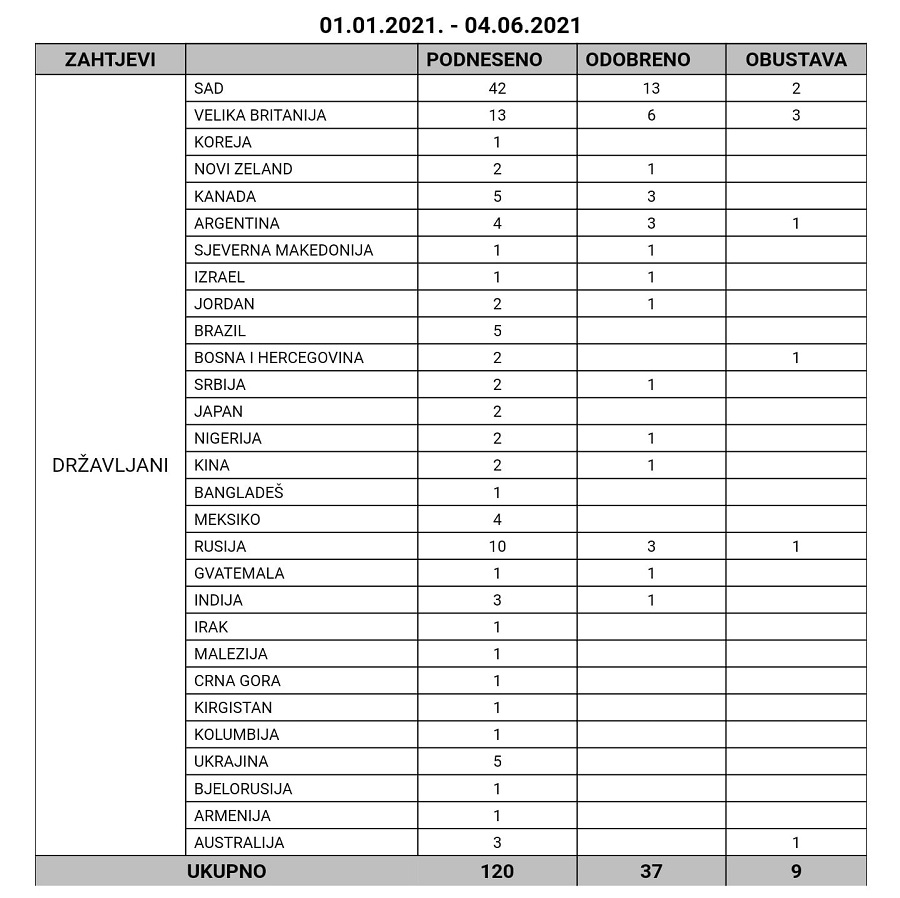
8. Regarding the visa, sorry permit, how many have applied so far, how many have been approved, and what level of applications do you expect once the borders fully open once more?
So far we have received 120 applications for 29 different countries. 37 applicants have been approved so far. The U.S. and U.K. digital nomads are taking a strong lead – making up for nearly half of all applications. Russians are also showing great interest, closely following the U.K.
On one hand I am happy we have the first 100+ applications. On the other hand, I was secretly hoping for more. Countries like Barbados, who did a great PR campaign right after launching their visa – got over 1.000 applications in the first month. So, compared to those results, we cannot be happy with 120 applications.
I personally believe that we as a country could have done more to promote our permit internationally. I am being told by the Ministry of Tourism and Croatian National Tourist Board that the digital nomad permit will get more attention from their side, in promoting it, after the tourism season ends.
Hopefully, around that time, it will also be easier to travel again, so we can see a rapid increase in number of applications in the second half of this year.
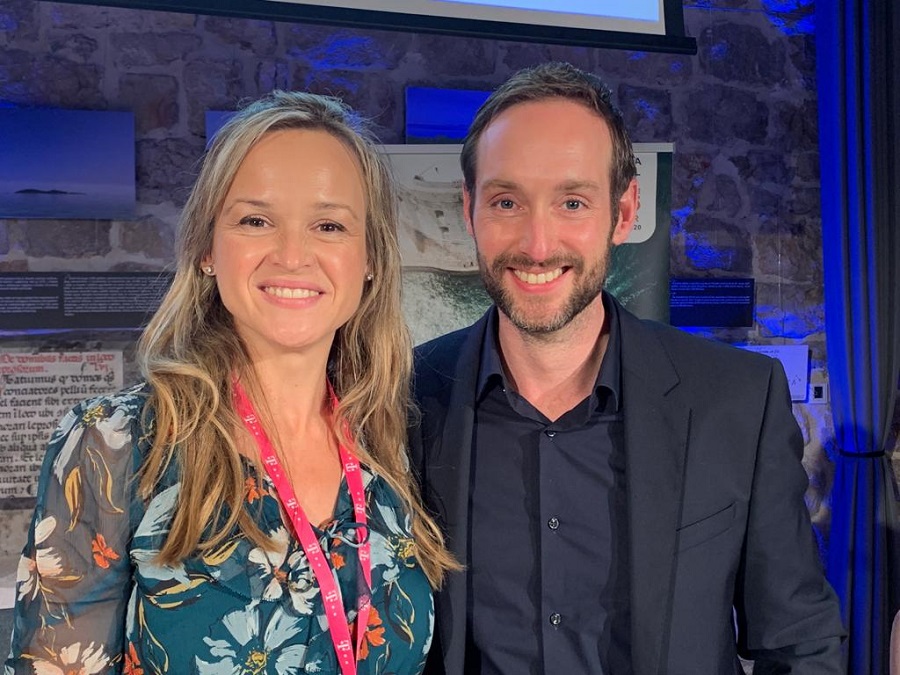
(Jan de Jong at the Dubrovnik for Digital Nomads conference in October 2020, with conference organiser Tanja Polegubic of Saltwater Nomads. Both are co-founders of the Digital Nomad Association Croatia)
9. Is the permit the finished article, or is it still a work in progress? The speed with which the whole processed was like driving a Rimac Nevera in the context of Croatian bureaucracy. Certain issues, such as the need for an apostille and the FBI background check proof, have caused some problems for some applicants. Are such issues open to being addressed?
The part that I am currently looking into are to make some additional legislative changes to the tax law. Currently, digital nomads are exempt from paying income tax in Croatia. We would however, like to see some additional clarity on digital nomads being exempt from paying taxes on other types of income, such as tax on capital gain, dividend tax, etc. Even though, the tax authorities stated that they would not go after such taxes, currently this is not defined by law. Together with KPMG we are looking into these open items, to make sure they are well defined.
Croatia will not waive from getting proof of no criminal record for applicants of the staying permit. Unfortunately, for some digital nomads, this is a time-consuming process to obtain such documentation, from i.e. the FBI. But if U.S. citizens who apply for the permit follow all necessary steps and take the time for their application, than I don’t see major obstacles here. This is not a problem of Croatian bureaucracy but more that of the U.S. bureaucracy.
Just to give you an example, as a Dutch citizen it would take me 30 minutes to get such proof of no criminal record at the city hall in the town where I would be registered. That is how its done in the Netherlands.
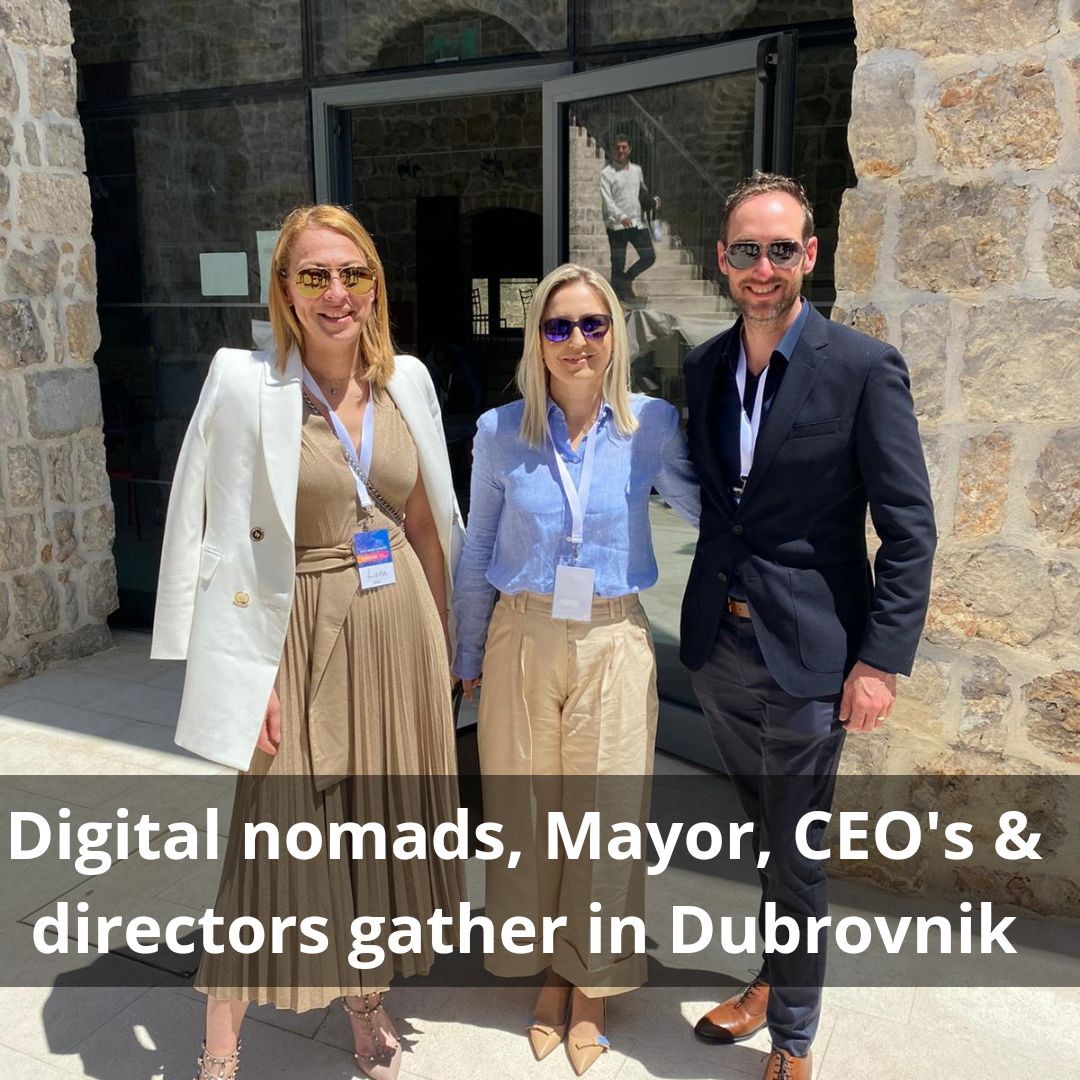
(De Jong with two of DNA's biggest corporate supporters - RBA Croatia CEO Liana Keseric, and KPDG's Kristina Grbavac - all three were panelists on the final day of Digital Nomads-in-Residence)
10. The support of private business has been excellent so far. Tell us more.
Yes, its great to see how some amazing Croatian companies have decided to support our efforts. And that in a very challenging year, where the Croatian economy was hurt severely as a result of Covid-19 and several major earthquakes. Hrvatski Telekom, Raiffeisen Bank, KPMG, Links, Younited Agency and several other companies have reached out – wanting to help and support. Hrvatski Telekom has already introduced a special proposition for digital nomads, offering unlimited, fast, mobile internet for just 60,00 kn per week – without contract obligation. It is great to see the largest telecom provider in Croatia demonstrating such leadership.
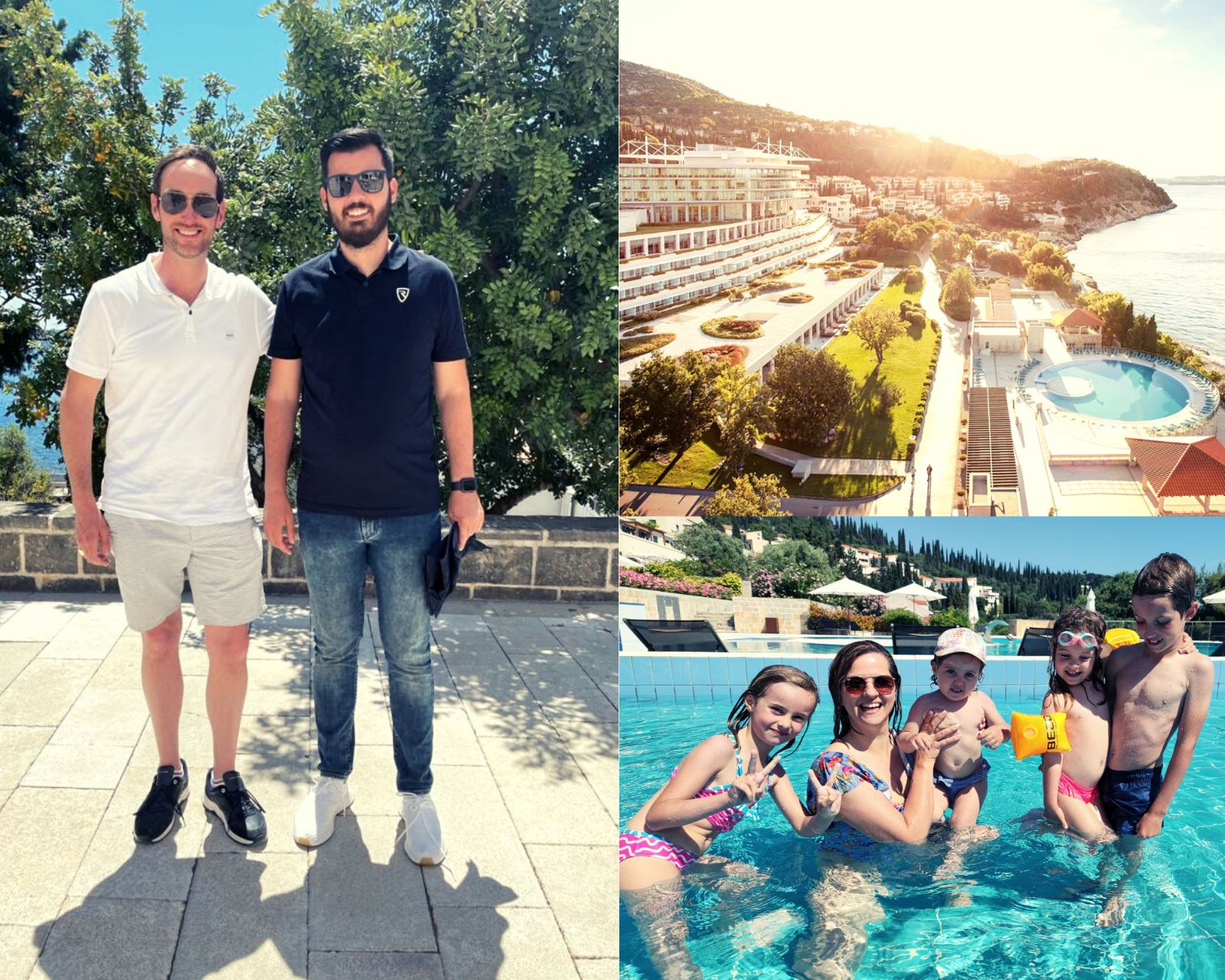
(Living the Croatian dream with and a meeting of the man who makes one very fast car)
11. And finally, what are the next steps for Croatia on its digital nomad journey?
For a change, we have the laws on our side in Croatia. The Croatian government did what it had to do to welcome digital nomads to come to Croatia. Now, we need to focus on building community, infrastructure and to promote Croatia internationally as a digital nomad hot spot in Europe. You know what they say – it takes 10 years to have overnight success. Right now, we are in year 1. I am super excited to see where we can take this in the coming decade. What it requires to turn this into a success is action today!
For more information on Zagreb Digital Nomad Week 2021 and Zagreb Digital Nomad Ambassador Project, visit the Saltwater Nomads website.
For the latest news and features on digital nomads in Croatia, follow the dedicated TCN section.
Epidemiologist Branko Kolaric Discusses Tourist Season and Infection Rates
June the 7th, 2021 - Croatian epidemiologist Branko Kolaric sat down recently to discuss the rapidly approaching tourist season and what that might mean for infection rates in Croatia when all the foreign tourists leave at the end of summer.
As Poslovni Dnevnik writes, epidemiologist Branko Kolaric commented on the current epidemiological situation for N1 this morning, and when speaking about the restrictions in care homes and nursing homes, he said that for the oldest and most unwell residents of such facilities, visitors should be allowed in for longer than fifteen minutes if the said visitor is vaccinated.
"The only thing left of the restrictive measures in care homes is if the resident hasn't yet been vaccinated, and was in the hospital, that after hospital treatment they go into self-isolation and that unvaccinated visitors can visit them for only fifteen minutes," Branko Kolaric told N1.
He said that the current vaccination rate across Croatian nursing homes is very good.
''We really do have a high turnout and currently there are a total of just twenty infected people living in nursing homes across Croatia. Of those who have fallen ill, the majority are unvaccinated people, but also some people who have been vaccinated. We know that the vaccine doesn't protect anyone at a level of 100 percent, but in the third wave, mortality was reduced by twenty times,'' explained Branko Kolaric, adding that he hoped that this pace of vaccination would continue so that we could enter autumn more calmly.
"We still have enough people interested in getting vaccinated and I hope that we will continue to have those people vaccinated in sufficient numbers," Branko Kolaric added.
''It's possible that we have variations and don't have a descent to zero as we had last summer and that is why it's still important to adhere to the anti-epidemic measures, avoid having too much contact with others, especially people who aren't yet vaccinated, and to avoid larger crowds, because in doing all that you can get infected,'' said Kolaric.
He also spoke about a possible easing of the country's epidemiological measures.
''I do think that the measures will be revised before the summer arrives and it's possible that the provision of wearing masks in areas where people have been vaccinated will be abolished. So, it all depends on how many people get vaccinated. That being said, we can't rely solely on vaccination, but we must also adhere to measures until we achieve collective immunity. Where vaccination coverage is low, at around 30-40 per cent, it remains possible that new waves of infection will occur. We need a very high percentage of vaccination,'' explained Kolaric.
Many countries are currently talking about the new wave of the coronavirus pandemic that awaits them and that the question is not whether or not it will happen, but how strong it will be. Asked if a new wave of infection awaits Croatia after the tourist season, Branko Kolaric said that on the one hand it is a matter of speculation, and that, taking into account the situation in the country's nursing homes, where there are ten times fewer infected people and twenty times fewer deaths, we can expect just that.
''That’s why we need to vaccinate people. We're never going to completely eliminate the virus, but it is important to reduce the number of deaths caused by it,'' concluded Branko Kolaric.
For all you need to know about coronavirus specific to Croatia, including travel, border and quarantine rules, as well as the locations of testing centres and vaccination points across the country, make sure to bookmark our dedicated COVID-19 section and choose your preferred language.
Mayor Tomislav Tomasevic Walks to Work Citing City's Poor Financial Status
June the 7th, 2021 - New Zagreb Mayor Tomislav Tomasevic has been making quite the healthy habit of walking to work, citing the Croatian capital's dire financial status and three years of irresponsibility.
As Poslovni Dnevnik writes, upon arriving to work on foot once again on Monday, new Zagreb Mayor Tomislav Tomasevic said that he and his associates also came to work over the weekend to try to sort thing out as quickly as possible. He made sure to note that "the financial situation is not good" in the City of Zagreb.
"This is just the result of three years of financial irresponsibility. 2019 ended with a loss of 1.3 billion kuna, without any external reasons, it's just pure financial irresponsibility. 2020 ended with a loss of ''only'' 90 million kuna, but when you look at the Covid loans handed out by the Government and the deferred claims of ZET, Zagreb Holding and (Croatian) Waters, then that loss is much higher and that is, once again, more financial responsibility, because there was no rebalance when it was needed,'' stated the capital's brand new mayor.
He also said that from what he has seen so far of the spending of the city in 2021, it's quite safe to say that this year has been a financially irresponsible one as well, not unlike the previous three - to say the least.
"The main goal is to stabilise the city's finances and analyse the cash flows on a weekly and then on a monthly basis, to revise the procurement plan so that what is not crucial is postponed. Zagreb Holding's report shows a loss of around 305 million kuna,'' he said, adding that there is no worst-case scenario to speak of just yet, and that the new city government will do its best to stabilise these finances and this truly dire financial situation so that this situation doesn't have too many consequences.
For more, make sure to follow our dedicated Croatian politics section.
Adult Population Vaccination Rate in Croatia to Reach 50% by End of June
June 7, 2021 – With many in Croatia hoping for a more relaxed summer than 2020, all eyes and ears are on the country's healthcare professionals. Here's some news from the COVID front and the adult population vaccination rate in Croatia.
The constant following COVID19 infections are getting rather tiring for everyone. Croatians have turned their attention massively towards the tourism season and summer as the only chance to enjoy a bit of rest and relaxation. As the strain on the health system starts to lessen, the questions surrounding the future of restrictions imposed on businesses grow more common.
It is evident the main factor for getting life back to normal will be the vaccination process. Index.hr reports on the latest trends. Their article quotes Diana Mayer, an epidemiologist with the Croatian Institute of Public Health. She expressed her satisfaction with the interest in vaccination. It is no secret there have been those opposing the vaccine in Croatia But it seems a bigger part of the population is willing to get vaccinated in hope of restrictions being lifted. The official data says 1,33 million Croatians have been vaccinated at least once, with roughly 564,000 of those receiving both doses. In a country of barely 4 million inhabitants, this is not a negligible result. According to Mayer, we are to see half of the population vaccinated by the end of June. Hopefully, this translates into a calmer Autumn.
Positive Trend
On Sunday the 6th of June 2021, there were 157 new cases of COVID19 infections in Croatia. The numbers seem to be going down, but it is way too early to draw any optimistic conclusions about the trends in near future. The waiting time for people who register for vaccination is also declining. Epidemiologist Mayer said this is not due to the decline of interest. More positive news comes from KB Dubrava (Clinical Hospital Dubrava), the largest COVID hospital in Croatia. KB Dubrava is to resume its normal function today and starts receiving non-COVID19 patients after 217 days. Let's hope this is just the beginning of a long-lasting positive trend.
For all you need to know about coronavirus specific to Croatia, including travel, border, and quarantine rules, as well as the locations of vaccination points and testing centres across the country, make sure to bookmark our dedicated COVID-19 section and select your preferred language.
Rixos Dubrovnik Director on Luxury Tourism Expectations this Season
June 7, 2021 - Expectations from the tourist season are more optimistic than last year, says the Rixos Dubrovnik director, Ayhan Basci.
Expectations from the tourist season are more optimistic than last year. Still, the epidemiological picture and the readiness of destinations to provide the highest level of service and convince tourists that they are safe on holiday is crucial, says the director of Rixos Premium Dubrovnik Ayhan Basci on Novac.hr.
"More tourist arrivals and hotel reservations in Dubrovnik can be expected from the end of June and July, when we could see the first results of the opening of new airlines from the USA, Moscow, Poland, Ukraine, Israel, Paris, Lyon, Luxembourg, and others. Vaccination is certainly a key tool that will enable a return to a kind of 'normality.' However, tourists will certainly be measured by the general situation in a particular destination and the level of measures implemented to ensure a favorable epidemiological picture. This certainly includes Ccovid passports as well as the availability of tests. I believe that the combination of all these tools will make the season more successful than last year," Basci said in an interview with Hina.
Basci notes that countries such as Spain, Greece, Portugal, and others have undertaken numerous promotional and other activities for the summer to attract tourists. At the same time, when asked about the offer and prices, he says that in Dubrovnik, as elsewhere, prices are higher than last year.
"This is not uncommon given the circumstances. Higher prices are an indicator and expected higher demand this summer. Other Rixos hotels in the United Arab Emirates or Turkey have similar prices. However, this season will be more specific in terms of what security and unique destination experience it can provide guests, not at the cost of accommodation," Basci says.
Regarding tourist demand and supply this year in the still present pandemic, he believes that countries that have approached the vaccination process seriously and where it is taking place without delay should not have problems with the number of reservations and tourist arrivals.
"It is essential for each of us today that travel is a safe zone, and free time and money earned are valued more than before, and in that sense, it is not enough to offer only 'sun and sea.' Tourism and hospitality workers should provide their guests with the added value of a destination based on service and offering the highest quality, from top gastronomy to entertainment, nature tours, and more, and destinations that offer selective forms of tourism will be more successful and competitive even after a pandemic," he adds.
He points out that the biggest advantage of Croatia is its beauty with untouched Mediterranean nature, recognizable history, heritage, and culture, which is why it is regularly placed on the lists of the world's most desirable destinations and is a member of the EU, and is easily accessible to the European market and can respond to almost all the requirements of the new generation of passengers.
"I see certain shortcomings of Croatian tourism in the limited number of high-quality tourist and catering staff, which is the result of a large number of young people leaving the country for economic reasons. Therefore, Croatia should be more open to foreign workers," Basci said.
He adds that in the offer of luxury tourism, high-paying guests must be provided with added value through services and continuous review and improvement of their own capacities to provide the best to guests.
Therefore, according to him, a stronger synergy of the private and public sectors is needed, which should cooperate more in managing the destination and agreeing on minimum standards for all levels of services, which everyone then follows and implements.
This would lead to year-round tourism that Croatia can have, so Dubrovnik and other most famous destinations should be open all year round and provide services continuously, says Basci.
"For example, Dubrovnik currently differs from the Cote d'Azur in that it is possible to fly to southeastern France at any time of the year, and hotels, restaurants, bars, shopping, and more are available in winter. If this level of service availability were ensured in Dubrovnik, we would certainly have guests in the winter as well, which would result in several benefits for the local population and the economy as a whole," says the hotelier.
Noting that the Rixos group has been present in Dubrovnik with one hotel for more than 16 years and that 150 million kuna was invested in its renovation last year, which was the highest for Dubrovnik tourism last year. Basci added that they are ready to receive guests looking for luxury a five-star lifestyle hotel, which is also a certain turnaround in the business.
"The challenges posed by the coronavirus pandemic to the tourism sector have adversely affected the business of the Rixos Group, as well as other businesses operating in the field of tourism. However, I am proud that none of the 180 full-time employees at the Rixos Premium Dubrovnik hotel was fired, even though the hotel was empty, and we did all the professional practices," Basci points out.
Rixos, like other hotel chains, has seen a drop in revenue in the pandemic but hopes for better results this season.
He says that Rixos Premium Hotel is one of the most luxurious in Croatia and one of eight in the world. When asked why he thinks there are not more luxury hotels in Croatia, he says that the answer can be found in destination management.
"The public and private sectors should join forces and, through destination management, strengthen the turn towards the development of a luxury segment of the market, in which there is no place for mass. Luxury tourism for a destination has several advantages, especially in the context of sustainability and minimizing environmental and community impacts. Although Dubrovnik can also benefit from cruises, I think that the development of elite tourism and ensuring the presence of high-paying guests is a better direction for the destination, with not only a luxury hotel offer but the entire offer of places, including quality shopping, excellent restaurants, rent luxury boats, renowned clubs, beaches and the like. In that sense, I see more room for progress in the offer and facilities of Dubrovnik," says Basci.
Asked whether Rixos is considering or planning a new acquisition or investment in Croatia, Basci said he always analyzes market opportunities, but also that it would make it easier for entrepreneurs who want to do business in Croatia, including the hotel industry, to simplify the entire investment system and related administrative steps.
For more on travel in Croatia, follow TCN's dedicated page.
New Air Pannonia Aircraft from Osijek Solemnly Welcomed (PHOTOS)
June 7, 2021 - The new Air Pannonia aircraft was solemnly welcomed at Osijek Airport!
It arrived at Osijek's Klisa Airport from London! After two aircraft, the private company Air Pannonia strengthened its fleet with another business aircraft Cessna Citation 525A-CJ2, registration number 9A-JET, making them the only company in Croatia that owns three JETs that are primarily used to transport VIP passengers and medical organ transport.

Slobodan Kadic
"It is an aircraft that is one of the most comfortable in its class, and it arrived from the United Kingdom. Since the demand for flights with CJ2 has increased, they decided we follow the needs of the market and increase capacities," points out Zrinka Vlašić Kujundžija from Air Pannonia's marketing team.

Slobodan Kadic
In addition to the three aircraft, they are proud of the arrangement and expansion of the service capacity and hangar at Klisa Airport, where they organized the ceremonial arrival of the new aircraft, which was greeted by a jet of water cannons by firefighters.

Slobodan Kadic
Air Pannonia is a sister company of Air Tractor, which has a 28-year tradition in aviation. The company is family-owned, and they are the only company in Croatia that deals with all aviation segments (pilot training, service, pilot English language testing, medical organ transport, and, of course, VIP transport). Pilots from Croatia and the world are trained there, and they also own two Cessnas and the Antonov aircraft, which is known to all Osijek residents because it sprays mosquitoes.

Slobodan Kadic
"Air Pannonia is now already a recognizable brand in the European and wider market, and so on not surprisingly, there is a need for further expansion and investment in fleet expansion. Our permanent clients are people from the business world, the world of sports, as well as show business who have a permanent need for our services and transportation of business users," concluded Vlašić Kujundžija, emphasizing that their planes fly all over the world, from Brussels to Mykonos, Prague, London or Istanbul.
From Zagreb to Osijek in 22 minutes!
The newly arrived aircraft flew for the British Zenith Aviation. The flight to Zagreb lasted 1 hour and 52 minutes, which is a great time because they had many backwinds, and the flight from Zagreb to Osijek lasted 22 minutes. It is from 2004 and has a capacity of seven passengers and one of their existing aircraft. It has 4200 hours of flight time which is very little in aviation jargon and can be said to be like new.
"We think it will serve us for about ten years, and its average speed is 400 knots. We are starting the registration process in Croatia, and I hope that within 40 days, they will be able to be seen in the European sky," said Krešimir Vlašić, director of flight operations, co-owner of the company, and captain.

Slobodan Kadic
"They are currently the only form of business traffic as most commercial lines have been discontinued, giving them a huge advantage. Business people who used to fly business class expect that they will now fly a private plane for that money, which is not realistic. Their traffic has increased, they do not suffer losses, but the price of labor has fallen, i.e., the price of an hour of an airplane has fallen compared to the previous two years. We can be satisfied because we ended last year with 1500 hours of flight, which is quite good, and we expect even more this year," concluded Vlašić.
Follow the latest on flights to Croatia HERE and the latest travel updates and COVID-19 news from Croatia HERE.
For more on travel in Croatia, follow TCN's dedicated page.
Remembering Dražen Petrović 28 Years Later
June 7, 2021 - Remembering Dražen Petrović, who died 28 years ago today.
On this day, 28 years ago, Dražen Petrović, a member of the Croatia basketball team and one of the best Croatian athletes of all time, was killed in a car accident on the motorway near the German city of Ingolstadt.
He was a basketball player and a role model, the Mozart of sports, but tragically died at the age of 29 during the peak of his playing career.
Dražen played his last match against Slovenia in the qualifications for the European Championship in Wroclaw. It was June 5, 1993. The Croatia national team returned from Poland by plane, but Dražen set off in a car with his girlfriend behind the wheel. He has no idea it would be his last drive.
Dražen was born on October 22, 1964, in Šibenik. His love for basketball has been with him since he was a small child. His exceptional perseverance and dedication to daily training with undeniable talent quickly made him one of the best in all age groups.
At the age of sixteen, he joined the Šibenik first team. He brought his hometown to the title of Yugoslav champion in 1983.
Cibona and Real Madrid were unreachable to all European clubs when Dražen played in their ranks. Having achieved everything in Europe, he went to the strongest league in the world - the NBA.
Although he sat more than played for the first season due to politics inside Portland, he showed his phenomenal talent two years later with the New Jersey Nets. Not only was he the team’s best shooter in 1992 (especially at three-pointers), but also the best European to have played in the NBA league so far.
That year, Dražen led the Croatia national team to its greatest success, silver at the Olympic Games in Barcelona, in the final clash with the only real Dream Team played by the best representatives of the NBA and some of the best basketball players in history - Michael Jordan, Larry Bird, Magic Johnson, Scottie Pippen, and others.
As a player, he received the Franjo Bučar State Award for Sports in 1992, and posthumously, this time for his life's work, he received the same award in 2002.
He was inducted into the Basketball Hall of Fame in 2002.
Source: HRT
Voluntary Croatian Chamber of Commerce Membership Won't Come to Pass
June the 7th, 2021 - The much desired voluntary Croatian Chamber of Commerce membership won't come to be, despite the pleas and frustrations of many company owners who can't seem to understand what on Earth they're paying for by being forced to be members.
As Poslovni Dnevnik/Marija Brnic writes, about a month or so ago, the Croatian Government left the domestic economy in doubt as to what model of Croatian Chamber of Commerce (HGK) system reform to follow. It had otherwise changed the previously announced abolition of mandatory Croatian Chamber of Commerce membership for all companies to the retention of mandatory membership, but with the exception of small and micro enterprises needing to pay any such associated fees.
The first step has now been launched in the preparation of legal amendments that will solve this long-standing and frustrating issue, which is to put into public discussion the form of the previous assessment of the Law on the Croatian Chamber of Commerce that the Ministry of Economy released on Friday.
The aforementioned Ministry states that the goal of the future law is to introduce voluntary Croatian Chamber of Commerce membership, which would stimulate the modernisation of the chamber's system and offer services that would attract new and motivate old members to stay within the Croatian Chamber of Commerce. The size of any given enterprise is not stated, and therefore it can be logically concluded that this freedom of choice could indeed apply to all companies.
However, confusion was caused by the continuation of the previous assessment of that same form, in which the focus was primarily placed on releasing the obligation to pay membership fees for small and micro enterprises, while medium and large ones would "remain in the payment regime". Contrary to the set goal of introducing voluntary Croatian Chamber of Commerce membership, which entails the total abolition of compulsory membership, the continuation of the proposal communicates only the abolition of membership obligations for small and micro enterprises.
In the unofficial communication from the legal circles of the Croatian Chamber of Commerce, one immediately hears the interpretation that this is probably an "awkwardly" formulated explanation, but also that the state could still abolish membership obligations for all businesses.
The Ministry of Economy clarified the dilemma - when asked about this issue, they replied that Croatian Chamber of Commerce membership would indeed remain mandatory, with the exception of micro and small enterprises, who would remain members but would not longer need to pay any fees. Such companies otherwise make up an astounding 97 percent of the chamber's members. So, nothing can be gathered whatsoever regarding the announced introduction of voluntary membership only.
A system of categorisation for the payment of Croatian Chamber of Commerce membership fees
At this stage of defining further reform, it isn't clear what effect things will have on the future financing of the chamber and whether certain activities will be supported by the state budget.
The Ministry only envisages that Croatian Chamber of Commerce membership fees will be paid according to a specific category, depending on the economic power of a given company, which will be determined by the criteria of its size, income and total assets, and it is stated that the HGK Assembly will determine the price list for the payment of such a fee.
In assessing the effects, the Ministry believes that only small and micro enterprises will see them, estimating that it will not have much of an effect because it is a release of a mere 42 kuna per month, which is "too small for such savings to have an effect."
The public debate on the form of the preliminary impact assessment of the law on the Croatian Chamber of Commerce will go on until June the 21st, and will then by followed by the drafting of the related bill. This also indicates that the proposal will not be in the parliamentary procedure in mid-July, as was previously planned.
The introduction of voluntary Croatian Chamber of Commerce membership, which will actually be reduced down to the abolition of payment obligations for small businesses, according to the set schedule will follow within 30 days after the entry into force of the new Law on the Croatian Chamber of Commerce, which will have one year to reform.
A similar reform, although not really in focus at the moment, will follow for the Croatian Chamber of Trades and Crafts.
For more, follow our politics section.


